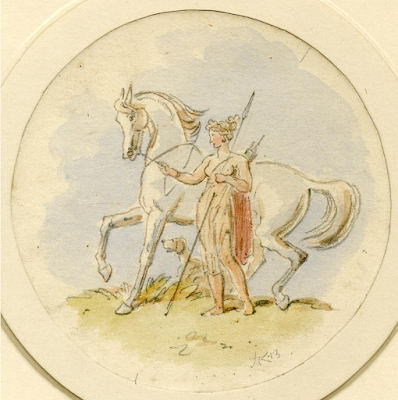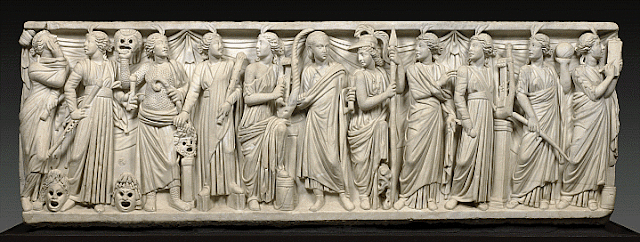 |
| Hablot Knight Browne (Phiz) Amazon with Horse and Dog ca. 1860 drawing, with watercolor British Museum |
 |
| Hablot Knight Browne (Phiz) Grecian Hunter with Horse and Dog ca. 1860 drawing, with watercolor British Museum |
 |
| Giulio Carpioni Bacchanal ca. 1660-65 oil on canvas (sketch) Museo Thyssen-Bornemisza, Madrid |
 |
| John Carroll Parthenope ca. 1925 oil on canvas Los Angeles County Museum of Art |
 |
| Cornelis van Haarlem Diana as Goddess of the Hunt 1607 oil on panel Minneapolis Institute of Art |
 |
| Gerrit van Honthorst Mars ca. 1624-27 oil on canvas Milwaukee Art Museum |
 |
| Jacob Jordaens Allegory of Victory with Antique Deities and Heroes ca. 1660-65 drawing, with watercolor Morgan Library, New York |
 |
| Louis-Jacques Pillon Castor and Pollux triumphant over Death ca. 1790 bronze relief panel Victoria & Albert Museum, London |
 |
| Pseudo-Pacchia Head of Polyphemus and Putto ca. 1530 drawing British Museum |
 |
| Roman Empire Athena 2nd-3rd century AD colossal marble statue Yale University Art Gallery |
 |
| Roman Empire Dionysus 1st century BC - 1st century AD marble statue Chrysler Museum of Art, Norfolk, Virginia |
 |
| Roman Empire The Muses AD 240-260 marble relief panel from sarcophagus Nelson-Atkins Museum of Art, Kansas City, Missouri |
 |
| Roman Empire Venus Genetrix 2nd century AD marble statue Getty Museum, Los Angeles |
 |
| John Runciman Study of Antique Satyr and Profile of Alexander Runciman ca. 1765 drawing Scottish National Gallery, Edinburgh |
 |
| Giandomenico Tiepolo Chronos abducting Cupid ca. 1758 drawing Staatsgalerie, Stuttgart |
 |
| Édouard Vuillard Venus de Milo in Studio Interior ca. 1920 drawing Staatsgalerie, Stuttgart |
from North Point North
Someone asked about the aura of regret
And disappointment that surrounds these poems,
About the private facts those feelings might conceal,
And what their source was in my life.
I said that none of it was personal,
That as lives go my own life was a settled one,
Comprising both successes and misfortunes, the successes
Not especially striking, the misfortunes small.
And yet the question is a real one,
And not for me alone, though certainly for me.
For even if, as Wittgenstein once claimed,
That while the facts may stay the same
And what is true of one is true of both,
The happy and unhappy man inhabit different worlds,
One still would want to know which world this is,
And how that other one could seem so close.
So much of how life feels lies in the phrasing,
In the way a thought starts, then turns back upon itself
Until its question hangs unanswered in the breeze.
Perhaps the sadness is a way of seeming free,
Of denying what can change or disappear,
Of tearing free from circumstance,
As though the soul could only speak out from the
Safety of some private chamber in the air.
– John Koethe (2002)